-
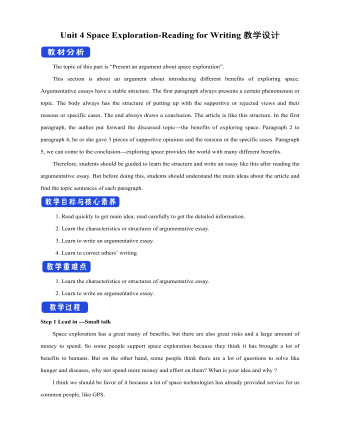
新人教版高中英语必修3Unit 4 Space Exploration-Reading for Writing教学设计二
⑦在我看来, 探索太空是值得的。As far as I am concerned, it is worthwhile to explore the space.Step 10 Writing---draftRecently, students in our class have had heated a discussion on whether space is worth exploring. Students hold different ideas about it.30% of us think space exploration is not worthwhile. They think space is too far away from us and our daily life and is a waste of money. And the money spent on space exploration can be used to solve the earth’s problems such as starvation and pollution.On the other hand,70% think space is worth exploring because we have benefited a lot from it,such as using satellites for communication and weather forecast. What’s more,with further space research,we may solve the population problem by moving to other planets one day. Also,space research will enable us to find new sources to solve the problem of energy shortages on the earth.As far as I am concerned, it is worthwhile to explore the space. Not only can it promote the development of society but also enrich our life. Step 11 Pair workExchange drafts with a partner. Use this checklist to help your partner revise his/her draft.1.Does the writer explain why he/she changed/wanted to change?2.Does the writer tell how the changes have improved or will improve his/her life?3.Is the text well-organised?4.Does the writer use words and expressions to show similarities and differences?5.Are there any grammar or spelling errors?6.Does the writer use correct punctuation?
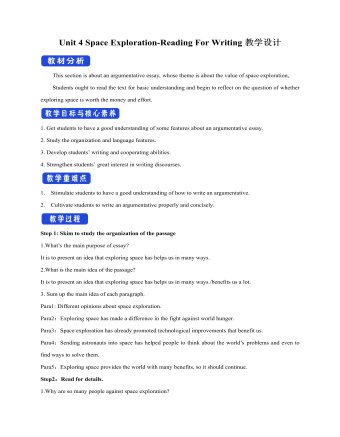
新人教版高中英语必修3Unit 4 Space Exploration-Reading For Writing教学设计一
另一方面,其余的人反对这个计划,因为它可能会导致一些不好的影响。7.I hold the belief that space exploration not only enable us to understand how the universe began but also help us survived well into the future.我坚信探索太空不仅能够使我们了解宇宙的起源而且能够帮助我们更好地走进未来。8.I think we should spend more time and money exploring space so as to provide new and better solutions to people's shortterm and longterm problems.为了给人类的短期和长期问题提供更新和更好的解决方法,我认为我们应该花更多的时间和金钱来探索太空。9.From my point of view,it is wrong of young people to depend on their telephones too much,which may do harm to both their physical and mental health.在我看来,年轻人过度依赖手机是不对的,因为它们可能会对他们的身心健康都有害。最近你班同学就“人类是否应该进行宇宙探索”这个问题进行了激烈的讨论。有人认为,探索宇宙不仅让人类更好地了解宇宙的发展,还可以用来指导农业生产,以及把一些探索太空的高新技术用于现实生活;也有一些人认为探索太空花掉了大量的人力物力;影响了人们的生活水平。请你根据以下情况写一篇报告并发表自己的观点。注意:1.写作内容应包括以上全部要点,可适当发挥,使上下文连贯;
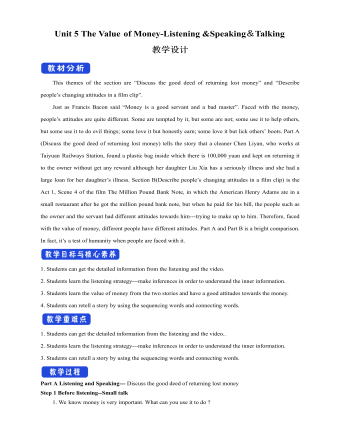
新人教版高中英语必修3Unit 5 The Value of Money-Listening &Speaking&Talking教学设计
4. A:We’d like to have someone to say a word at the beginning to welcome the group.B:↙Who?A:We thought that you or Dr.Johnson might do it.B用降调说Who,其意思是问,对方想让谁在开场时致欢迎词。Step 6 Pronunciation---Practice1. Listen to the short conversation and mark the intonation with ↗, ↙ or ↙, ↗. Then discuss with a partner what they intend to convey by using different intonation.Owner: You know what ?↗ It’s a million-pound bank note↙.Waiter 1: Really ?↗(question)Waiter 2: Really !↙(unbelievable and surprised)Waiter 3: Really ?!↙↗(first question then surprised)2. Listen to the conversations. Underline the parts that are stressed and mark the intonation. Then talk about the implied meanings of the responses with different intonations. Listen again and repeat.1) Henry: It’s a nice suit.Owner: Oh, it’s perfect!↙(The intonation means it is very suitable for Henry.)2) Henry: Well, that’s very kind of you.Owner: Kind, sir ?↗(what you said is not right) No, it’s kind of you. You must come whenever you want and have whatever you like. Just having you sit here is a great honour !!↙(welcome you to come again)3)Henry:Well, to be honest, I have none. Oliver:(happily) What luck!(excited) Brother↗, what luck!↙(It means “Didn’t you hear it?”)Henry: Well, it may seem lucky to you but not to me!↗(angry) If this is your idea of some kind of joke, I don’t think it’s very funny. Now if you’ll excuse me, I ought to be on my way.↙(If so, I would leave.)Roderick: Please don’t go↙...(hope Henry can wait for a moment)Part B Viewing and Talking---Describe people’s changing attitudes in a film clipStep 1 Before-listening---Tell the filmYou are going to watch part of the film The Million Pound Bank Note. Look at these photos and guess what happens in the film.
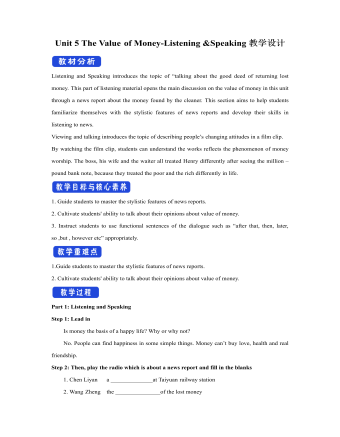
新人教版高中英语必修3Unit 5 The Value of Money-Listening &Speaking教学设计
Step 4: Listen again and decide if the following statements are true (T) or false (F).1 It was the first time Chen Liyan's story was reported. T口 F口2 Chen found 10,000 yuan in a small plastic bag in Taiyuan railway station口 F口3 Wang Zheng apologized to Chen because he couldn't offer her more money. T口 F口4 Chen took out a large loan to cure her daughter, T口 F口5 Wang set up a fundraising website for Chen's daughter after Chen told him about her situation. T口 F口Step 5:After listening, discuss the questions.1 What kind of person do you think Chen Liyan is?Chen Liyan is generous and honest because she returned a large sum of money to the owner.2 Did Chen return the money because she didn't need it?No. She returned the money because it was the right thing to do. Evidence for this is that she refused to accept the reward money because she felt that it had not been earned. 3 Is it common for people to do what Chen did?It depends on the culture. In some countries it is quite common to return money that has been found. In other countries, people believe "Finders are keepers!" 4 How did Wang Zheng feel about the return of his money?He must have been very happy and relieved to have gotten his money back. We know this because he thanked Chen repeatedly and even offered her a reward.5 Why did Ma Dongbao tell Wang about Chen's family?He must have had great sympathy for Chen and her daughter and wanted to help them.'We know this because he arranged help for them. 6 How did the news reporter feel about Chen's actions?The news reporter felt that it showed that money wasn't the most important thing in life. We know this because the reporter told us that this is what Chen believes. and then said, “that's a great attitude to take."
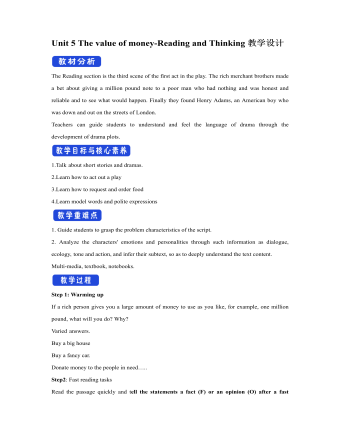
新人教版高中英语必修3Unit 5 The value of money-Reading and Thinking教学设计二
? Could you offer me some kind of work here?? I don’t want your charity, I just want an honest job.? Careless: I landed in Britain by accident.Step 7:Consolidation.? Find Henry? Roderick and Oliver were I .making a bet when they saw Henry, a poor young man. ? Know Henry? About a month ago, Henry was sailing and later he found himself carried out to sea by a strong wind. Fortunately, he 2.was spotted by a ship. And it was the ship that brought him to 3.England? Offer money to Henry ? Oliver and Roderick gave Henry a letter and told him that there was money in it. They 4.persuaded him to accept it, and made him 5.promise that it wouldn't be opened until 2 o'clock.Step 8:Language pointsa large amount of: a large quantity of; a great deal ofe.g. They bought a large amount of furniture before they moved their new house.make a bet: make an arrangement to risk money, etc. on an event of which the result is doubtful.e.g. We made a bet on the result of the match.permit sb to do something: allow somebody to do somethinge.g. My mother doesn’t permit me to ride in the street after it rained.by accident: as a result of chancee.g. I only found it by accident.stare at: look at somebody or something with the eyes wide open in a fixed gaze( in astonishment, wonder, fear, etc)to be honest: to tell you the truth; to be franke.g. To be honest, I don’t think we have a chance of winning.Step7 Homework:What do you think will happen to Henry? Will the bank-note help him or get him into trouble?
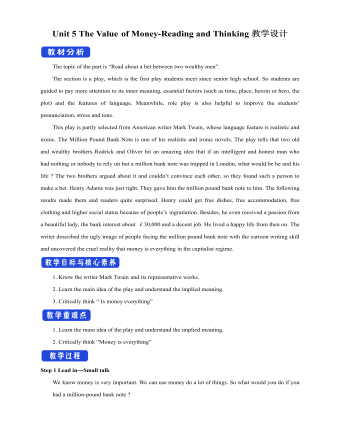
新人教版高中英语必修3Unit 5 The Value of Money-Reading and Thinking教学设计一
Everybody wants to get wealth.In today’s material world,making money or becoming wealthy symbolizes a person’s success and capability. Many people just make every effort, pay any price to attain greater wealth. With money,they can buy nice, large apartments in nice neighborhood. With money they can own luxurious cars. Wealth seems to bring all happiness in life.But is wealth the only road to happiness? Not really. There are many things in the world, which are beyond the means of money, such as friendship, love, health and knowledge. People are so preoccupied with struggling for money that they have no time or would not take the time to form or maintain friendship. What happiness can they feel living as lonely miserable creatures without love or friends in the world even if they accumulate tremendous wealth?In my opinion, people can’t do anything without money, but money is not everything. What money will bring you depends on your personal belief and goal in life. If you are kind enough to help others, especially the poor, money is a good thing to you. With it, you can do much more for the benefit of people and your country, and it will add to your own happiness. If you want money just for your own needs, you’ll never be satisfied or happy. In a word,you should have money spent for more people. Only then can money be the source of your happiness.Step 8 Homework4 students in a group, one acts Roderick, one Oliver, one servant and the fourth one acts Henry Adams, then listen to the tape, pay more attention to the difference between American English and British English in pronunciation, stress, tone.
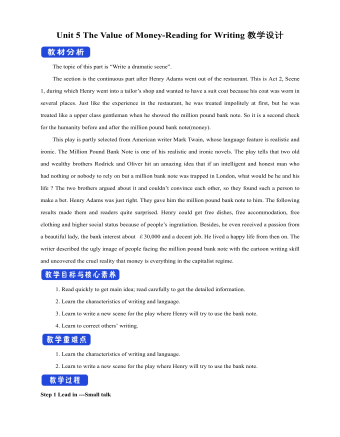
新人教版高中英语必修3Unit 5 The Value of Money-Reading for Writing教学设计二
2. 您能看到, 我头发太长了。You can see that my hair is much too long.3. 无论什么时候, 只要您想回来就回来。Please come back whenever you want.4. 您仅有很少的头发要理! You only have too little hair to cut !5. 为您服务是我的荣幸!It is my honour to serve you!Step 9 Writing(Henry is walking down the street when he sees a sign for a place that cuts hair. He decides to have it cut. )H=Henry B=BarberH: Good afternoon, I’d like to have my hair cut, if I may. (The barber looks at Henry’s hair and continues cutting another man’s hair. ) Er, I’d really like a haircut. As you can see it’s much too long. B: (in a rude manner) Yes, I can see that. Indeed, I can. H: Fine, well, I’ll have a seat then. (He sits in one of the barber’s chairs. The barber turns to look at Henry. )B: It’s quite expensive here, you know! Are you sure you can afford it?H: Yes. I think so. (After his hair is cut, the barber tells Henry how much he must pay. Henry shows the barber the bank note. )B: Why Mr. . . (looks shocked)H: Adams. Henry Adams. I’m sorry. I don’t have any change. B: Please don’t worry! (wearing a big smile) Nothing to worry about! Nothing at all! Please come back whenever you want, even if you only have too little hair to cut! It will be my honour to serve you!Step 10 Pair workExchange drafts with a partner. Use this checklist to help your partner revise his/her draft.1. Are all the elements of a play included and in good order ?2. Do the character use suitable language ?3. Are the stage directions clear and useful ?4. Is the plot clear and exciting enough ?
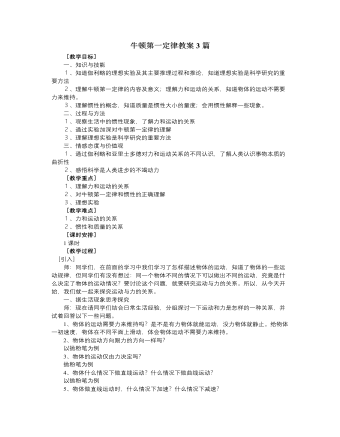
人教版新课标高中物理必修1牛顿第一定律教案3篇
一、知识与技能1、知道伽利略的理想实验及其主要推理过程和推论,知道理想实验是科学研究的重要方法2、理解牛顿第一定律的内容及意义;理解力和运动的关系,知道物体的运动不需要力来维持。3、理解惯性的概念,知道质量是惯性大小的量度;会用惯性解释一些现象。二、过程与方法1、观察生活中的惯性现象,了解力和运动的关系2、通过实验加深对牛顿第一定律的理解3、理解理想实验是科学研究的重要方法三、情感态度与价值观1、通过伽利略和亚里士多德对力和运动关系的不同认识,了解人类认识事物本质的曲折性2、感悟科学是人类进步的不竭动力[教学重点]1、理解力和运动的关系2、对牛顿第一定律和惯性的正确理解3、理想实验[教学难点]1、力和运动的关系2、惯性和质量的关系
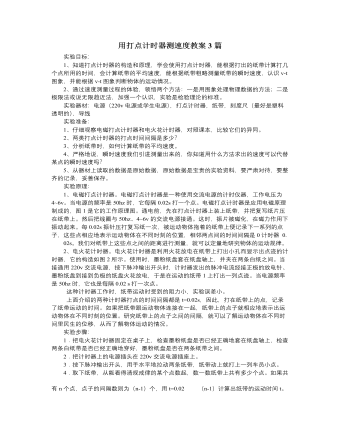
人教版新课标高中物理必修1用打点计时器测速度教案3篇
实验目标:1、知道打点计时器的构造和原理,学会使用打点计时器,能根据打出的纸带计算打几个点所用的时间,会计算纸带的平均速度,能根据纸带粗略测量纸带的瞬时速度,认识v-t图象,并能根据v-t图象判断物体的运动情况。2、通过速度测量过程的体验,领悟两个方法:一是用图象处理物理数据的方法;二是极限法或说无限趋近法,加强一个认识,实验是检验理论的标准。实验器材:电源(220v电源或学生电源),打点计时器,纸带,刻度尺(最好是塑料透明的),导线实验准备:1、仔细观察电磁打点计时器和电火花计时器,对照课本,比较它们的异同。2、两类打点计时器的打点时间间隔是多少?3、分析纸带时,如何计算纸带的平均速度。4、严格地说,瞬时速度我们引进测量出来的,你知道用什么方法求出的速度可以代替某点的瞬时速度吗?
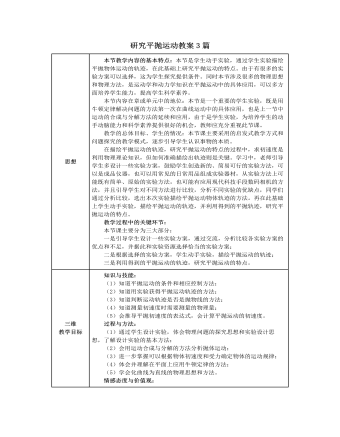
人教版新课标高中物理必修2研究平抛运动教案3篇
(给出仪器后先让学生思考如何设计实验、安装仪器、设计实验步骤,而后教师总结)实验步骤如下:①安装调整斜槽 :用图钉把白纸钉在竖直板上,在木板的左上角固定斜槽。②调整木板 :用悬挂在槽口的重锤线把木板调整到竖直方向,并使木板平面与小球下落的竖直面平行,然后把重锤线方向记录到钉在木板上的白纸上,固定木板,使在重复实验的过程中,木板与斜槽的相对位置保持不变。③确定坐标原点:把小球放在槽口处,用铅笔记下小球在槽口时球心在木板上的水平投影点O,O即为坐标原点。④描绘运动轨迹 :用铅笔的笔尖轻轻地靠在木板的平面上,不断调整笔尖的位置,使从斜槽上滚下的小球正好碰到笔尖,然后就用铅笔在该处白纸上点上一个黑点,这就记下了小球球心所对应的位置。保证小球每次从槽上开始滚下的位置都相同,用同样的方法可找出小球平抛轨迹上的一系列位置。取下白纸,描绘小球做平抛运动的轨迹。
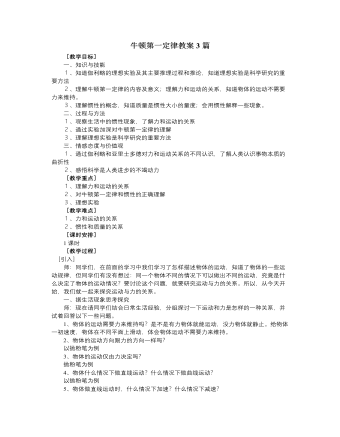
人教版新课标高中物理必修1牛顿第一定律教案3篇
一、知识与技能1、知道伽利略的理想实验及其主要推理过程和推论,知道理想实验是科学研究的重要方法2、理解牛顿第一定律的内容及意义;理解力和运动的关系,知道物体的运动不需要力来维持。3、理解惯性的概念,知道质量是惯性大小的量度;会用惯性解释一些现象。二、过程与方法1、观察生活中的惯性现象,了解力和运动的关系2、通过实验加深对牛顿第一定律的理解3、理解理想实验是科学研究的重要方法三、情感态度与价值观1、通过伽利略和亚里士多德对力和运动关系的不同认识,了解人类认识事物本质的曲折性2、感悟科学是人类进步的不竭动力[教学重点]1、理解力和运动的关系2、对牛顿第一定律和惯性的正确理解3、理想实验[教学难点]1、力和运动的关系2、惯性和质量的关系[课时安排]1课时[教学过程][引入]
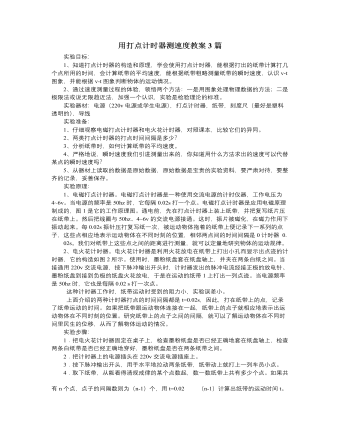
人教版新课标高中物理必修1用打点计时器测速度教案3篇
实验目标:1、知道打点计时器的构造和原理,学会使用打点计时器,能根据打出的纸带计算打几个点所用的时间,会计算纸带的平均速度,能根据纸带粗略测量纸带的瞬时速度,认识v-t图象,并能根据v-t图象判断物体的运动情况。2、通过速度测量过程的体验,领悟两个方法:一是用图象处理物理数据的方法;二是极限法或说无限趋近法,加强一个认识,实验是检验理论的标准。实验器材:电源(220v电源或学生电源),打点计时器,纸带,刻度尺(最好是塑料透明的),导线实验准备:1、仔细观察电磁打点计时器和电火花计时器,对照课本,比较它们的异同。2、两类打点计时器的打点时间间隔是多少?3、分析纸带时,如何计算纸带的平均速度。4、严格地说,瞬时速度我们引进测量出来的,你知道用什么方法求出的速度可以代替某点的瞬时速度吗?5、从器材上读取的数据是原始数据,原始数据是宝贵的实验资料,要严肃对待,要整齐的记录,妥善保存。
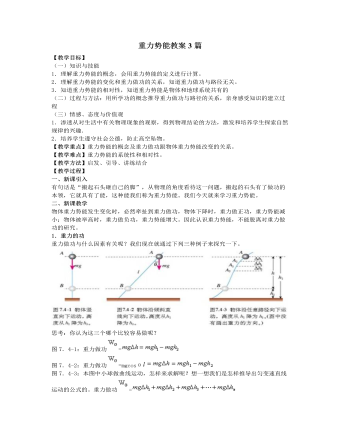
人教版新课标高中物理必修2重力势能教案3篇
(一)知识与技能1.理解重力势能的概念,会用重力势能的定义进行计算。2.理解重力势能的变化和重力做功的关系,知道重力做功与路径无关。3.知道重力势能的相对性,知道重力势能是物体和地球系统共有的(二)过程与方法:用所学功的概念推导重力做功与路径的关系,亲身感受知识的建立过程(三)情感、态度与价值观1.渗透从对生活中有关物理现象的观察,得到物理结论的方法,激发和培养学生探索自然规律的兴趣.2.培养学生遵守社会公德,防止高空坠物。【教学重点】重力势能的概念及重力做功跟物体重力势能改变的关系。【教学难点】重力势能的系统性和相对性。【教学方法】启发、引导、讲练结合【教学过程】一、新课引入有句话是“搬起石头砸自己的脚”,从物理的角度看待这一问题,搬起的石头有了做功的本领,它就具有了能,这种能我们称为重力势能。我们今天就来学习重力势能。二、新课教学
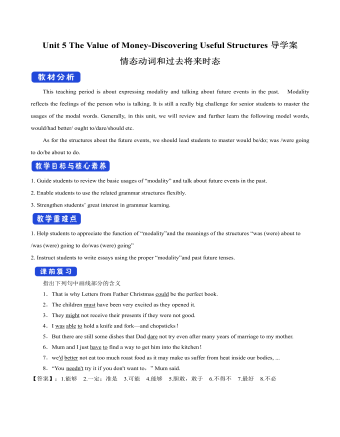
新人教版高中英语必修3Unit 5 The Value of Money-Discovering Useful Structures导学案
4.They were going to find someone to take part in their bet when they saw Henry walking on the street outside.[归纳]1.过去将来时的基本构成和用法过去将来时由“would+动词原形”构成,主要表示从过去某一时间来看将要发生的动作(尤其用于宾语从句中),还可以表示过去的动作习惯或倾向。Jeff knew he would be tired the next day.He promised that he would not open the letter until 2 o'clock.She said that she wouldn't do that again.2.表示过去将来时的其他表达法(1)was/were going to+动词原形:该结构有两个主要用法,一是表示过去的打算,二是表示在过去看来有迹象表明将要发生某事。I thought it was going to rain.(2)was/were to+动词原形:主要表示过去按计划或安排要做的事情。She said she was to get married next month.(3)was/were about to+动词原形:表示在过去看来即将要发生的动作,由于本身已含有“即将”的意味,所以不再与表示具体的将来时间状语连用。I was about to go to bed when the phone rang.(4)was/were+现在分词:表示在过去看来即将发生的动作,通常可用于该结构中的动词是come,go,leave,arrive,begin,start,stop,close,open,die,join,borrow,buy等瞬间动词。Jack said he was leaving tomorrow.
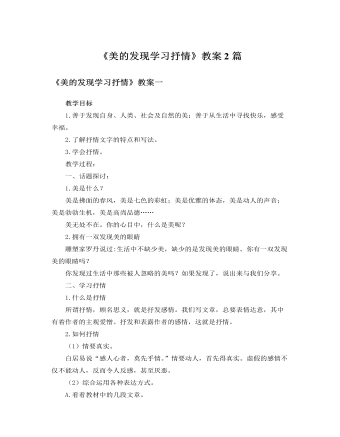
人教版高中语文必修2《美的发现学习抒情》教案2篇
写作指导:第一题要求写出自然美,在自然美中融进自己的感情。小路、流水、山峦、森林、天空、大海……都是实体事物,因此首先要求用写生的办法把它们表现出来,要写得准确,写出它们的特点和个性,尤其是写出它们的美。同时,也要把赞美之情不落痕迹地融化在描写之中。第二题是写一幅风景画或一张风景照片中的自然美景,以及美景中的一些细节,同时把自己心动的感觉写出来。在这里,关键是找到画或照片中的美,找到心动的感觉,如果找到了,再用文字把这美和感觉表达出来。当然,写风景美和写自己的感觉应是乳水交融的。第三题是用动情的笔墨把自己的一种经历写出来。这些经历似乎都是细节,都不是惊天动地的大事。是细节,就容易碰到,在题目列举的四种中,学生不难找到。即使不在这四种中,也可以,只要这种经历给了自己心灵以震撼或潜移默化的影响。
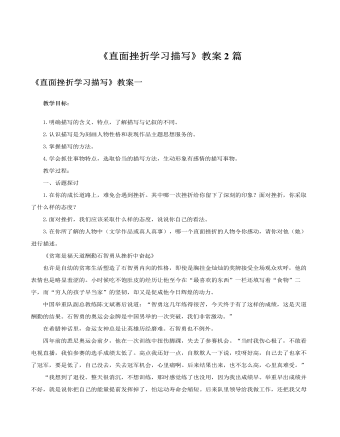
人教版高中语文必修2《直面挫折学习描写》教案2篇
《贫寒是福天道酬勤石智勇从挫折中奋起》也许是自幼的贫寒生活塑造了石智勇内向的性格,即使是胸挂金灿灿的奖牌接受全场观众欢呼,他的表情也是略显羞涩的。小时候吃不饱肚皮的经历让他至今在“最喜欢的东西”一栏还填写着“食物”二字,而“穷人的孩子早当家”的坚韧,却又是促成他今日辉煌的动力。中国举重队副总教练陈文斌赛后说道:“智勇这几年练得很苦,今天终于有了这样的成绩,这是天道酬勤的结果。石智勇的奥运会金牌是中国男举的一次突破,我们非常激动。”在希腊神话里,命运女神总是让英雄历经磨难。石智勇也不例外。四年前的悉尼奥运会前夕,他在一次训练中扭伤脚踝,失去了参赛机会。“当时我伤心极了,不敢看电视直播,我怕参赛的选手成绩太低了。高点我还好一点,自欺欺人一下说,哎呀好高,自己去了也拿不了冠军,要是低了,自己没去,失去冠军机会,心里痛啊。后来结果出来,也不怎么高,心里真难受。”
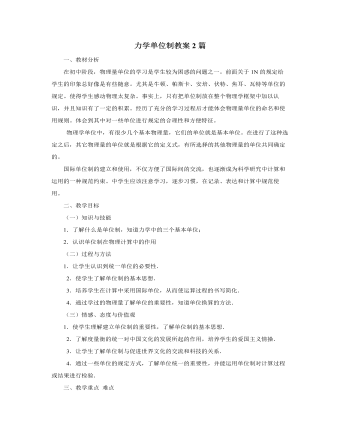
人教版新课标高中物理必修1力学单位制教案2篇
一、教材分析在初中阶段,物理量单位的学习是学生较为困惑的问题之一。前面关于1N的规定给学生的印象总好像是有些随意。尤其是牛顿、帕斯卡、安培、伏特、焦耳、瓦特等单位的规定。使得学生感动物理太复杂。事实上,只有把单位制放在整个物理学框架中加以认识,并且知识有了一定的积累。经历了充分的学习过程后才能体会物理量单位的命名和使用规则。体会到其中对一些单位进行规定的合理性和方便特征。物理学单位中,有很少几个基本物理量,它们的单位就是基本单位。在进行了这种选定之后,其它物理量的单位就是根据它的定义式,有所选择的其他物理量的单位共同确定的。国际单位制的建立和使用,不仅方便了国际间的交流,也逐渐成为科学研究中计算和运用的一种规范约束。中学生应该注意学习,逐步习惯,在记录、表达和计算中规范使用。二、教学目标(一)知识与技能1.了解什么是单位制,知道力学中的三个基本单位;2.认识单位制在物理计算中的作用
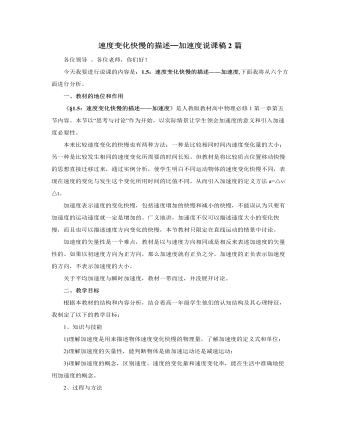
人教版新课标高中物理必修1速度变化快慢的描述─加速度说课稿2篇
本来比较速度变化的快慢也有两种方法:一种是比较相同时间内速度变化量的大小;另一种是比较发生相同的速度变化所需要的时间长短。但教材是将比较质点位置移动快慢的思想直接迁移过来,通过实例分析,使学生明白不同运动物体的速度变化快慢不同,表现在速度的变化与发生这个变化所用时间的比值不同,从而引入加速度的定义方法a=△v/△t。加速度表示速度的变化快慢,包括速度增加的快慢和减小的快慢,不能误认为只要有加速度的运动速度就一定是增加的。广义地讲,加速度不仅可以描述速度大小的变化快慢,而且也可以描述速度方向变化的快慢,本节教材只限定在直线运动的情景中讨论。加速度的矢量性是一个难点,教材是以与速度方向相同或是相反来表述加速度的矢量性的。如果以初速度方向为正方向,那么加速度就有正负之分,加速度的正负表示加速度的方向,不表示加速度的大小。
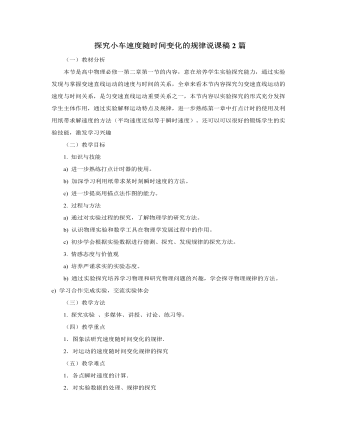
人教版新课标高中物理必修1探究小车速度随时间变化的规律说课稿2篇
(三)合作交流能力提升教师:刚才我们通过实验了解了小车的速度是怎样随时间变化的,但实验中有一定的误差,请同学们讨论并说出可能存在哪些误差,造成误差的原因是什么?(每个实验小组的同学之间进行热烈的讨论)学生:测量出现误差。因为点间距离太小,测量长度时容易产生误差。教师:如何减小这个误差呢?学生:如果测量较长的距离,误差应该小一些。教师:应该采取什么办法?学生:应该取几个点之间的距离作为一个测量长度。教师:好,这就是常用的取“计数点”的方法。我们应该在纸带上每隔几个计时点取作一个计数点,进行编号。分别标为:0、1、2、3……,测各计数点到“0”的距离。以减小测量误差。教师:还有补充吗?学生1:我在坐标系中描点画的图象只集中在坐标原定附近,两条图象没有明显的分开。学生2:描出的几个点不严格的分布在一条直线上,还能画直线吗?
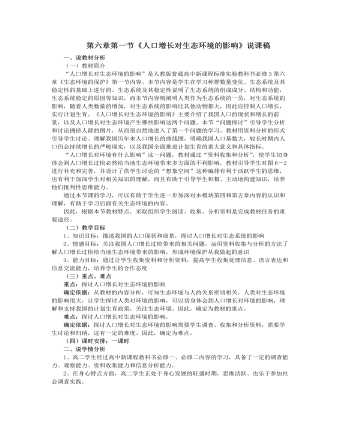
人教版高中生物必修3第六章第一节《人口增长对生态环境的影响》说课稿
3、讨论问题二:我国、我市人口增长对环境有那些影响?教师:让第三、第四组学生分别介绍、展示课前调查到的资料,说明人口增长对我国环境的影响、对三亚市环境的影响。学生:第三组学生派代表介绍人口增长过快对我国生态环境的影响。第四小组由学生自己主持“我市人口增长过快对三亚市生态环境的影响”讨论会,汇报课前调查到的资料和讨论,其它小组参与发言。教师:投影:课本图6-2组织学生讨论、补充和完善。学生:观察老师投影图片并进行讨论,对图片问题进行补充和完善。教学意图:通过让学生汇报、观察、主持,能让学生亲身体验,更深刻地理解人口增长对生态环境的影响,培养和提高学生的表达能力、观察能力、主持会议的能力。4、讨论问题三:怎样协调人与环境的关系?教师:组织第五组学生进行汇报课前调查到的资料,交流、讨论、发表意见和见解。学生:展示课件、图片,汇报调查到的情况,提出合理建议。





















